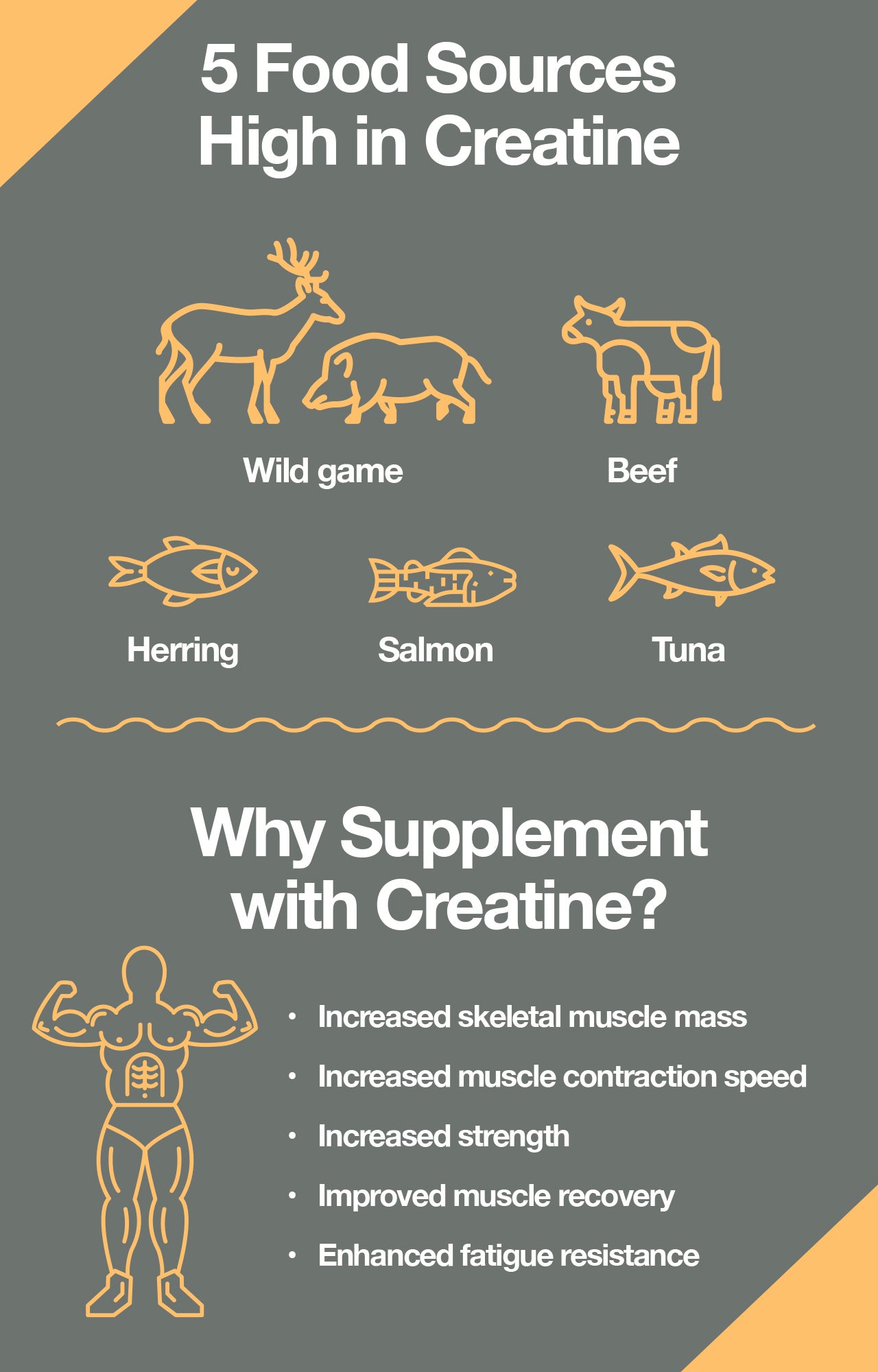What Is Creatine And How Does It Work?

Table of Contents
Are you looking to boost your athletic performance and build muscle? Then you've likely heard of creatine, a supplement rapidly gaining popularity among athletes and fitness enthusiasts. But what exactly is creatine, and how does it work its magic? This beginner's guide will unravel the science behind this naturally occurring compound and explore its potential benefits.
What is Creatine? Understanding the Basics
Creatine is a naturally occurring organic acid primarily found in skeletal muscle. It plays a crucial role in energy production within muscle cells, making it a popular choice for those seeking to enhance their physical performance.
Creatine's Natural Role in the Body
Your body naturally produces creatine, but supplementing can significantly increase its levels. Its primary function revolves around energy production:
- Creatine phosphate (PCr) is a crucial energy storage molecule. It rapidly donates a phosphate group to adenosine diphosphate (ADP), converting it into adenosine triphosphate (ATP). ATP is the primary energy currency of cells, fueling muscle contractions.
- Creatine helps maintain high-intensity energy levels. During short bursts of intense exercise, your body quickly depletes ATP. Creatine supplementation helps replenish ATP levels, delaying muscle fatigue and allowing you to perform at a higher intensity for longer.
Different Types of Creatine Supplements
While various forms of creatine exist, creatine monohydrate remains the most researched and effective.
- Creatine Monohydrate: This is the gold standard, offering superior bioavailability and effectiveness. Numerous studies support its benefits.
- Creatine Hydrochloride (HCL): Claimed to have better solubility and absorption, but research supporting these claims is less conclusive than for monohydrate.
- Creatine Ethyl Ester: Another form with purported enhanced absorption, though its effectiveness compared to monohydrate is debated.
Bioavailability and absorption rates vary across these forms. Creatine monohydrate boasts high absorption and is generally considered the best option due to extensive research confirming its efficacy.
How Does Creatine Work? The Science Behind the Supplement
Creatine's mechanism of action centers around its role in the energy system of your muscles.
The Creatine Phosphate System (ATP-PCr System)
The ATP-PCr system is your body's immediate energy source for high-intensity activities lasting up to about 10 seconds.
- Rapid ATP regeneration: When ATP is used during intense exercise, creatine phosphate quickly donates a phosphate group, regenerating ATP.
- Increased creatine phosphate saturation: Creatine supplementation increases the concentration of creatine phosphate within your muscle cells, enhancing the capacity of this system to produce energy. This leads to improved performance during short bursts of intense activity.
Creatine's Effects on Muscle Growth and Strength
Creatine's benefits extend beyond energy production. It also contributes to muscle growth and strength gains through several mechanisms:
- Increased water retention: Creatine attracts water into muscle cells, leading to increased cell volume. This cellular swelling stimulates muscle protein synthesis, contributing to muscle growth (hypertrophy).
- Enhanced muscle protein synthesis: Creatine may also directly stimulate muscle protein synthesis, the process of building new muscle proteins.
- Reduced muscle fatigue: By maintaining ATP levels, creatine helps reduce muscle fatigue, allowing for more intense and longer workouts.
Benefits of Creatine Supplementation
The evidence strongly suggests creatine offers several significant benefits:
Enhanced Athletic Performance
Creatine supplementation is particularly beneficial for activities requiring short bursts of high-intensity energy:
- Weightlifting: Creatine enhances strength, power, and overall performance in weight training.
- Sprinting: It improves sprinting speed and power output.
- High-intensity interval training (HIIT): Creatine helps maximize performance and reduce fatigue during HIIT workouts. Numerous studies show improved results in various sports and activities involving short, powerful movements.
Muscle Growth and Strength Gains
Studies consistently demonstrate that creatine supplementation, combined with resistance training, leads to significant increases in:
- Muscle mass: Creatine contributes to increased muscle size and volume.
- Strength: It enhances strength and power output, leading to improved performance in various strength-based activities. For optimal results, combine creatine with a consistent resistance training program.
Cognitive Benefits (if applicable)
While research is ongoing, some studies suggest potential cognitive benefits, such as improved memory and cognitive function. However, more research is needed to fully understand these effects.
Safe Usage and Side Effects of Creatine
Creatine is generally considered safe when used appropriately, but it's crucial to follow guidelines:
Recommended Dosage and Cycle Lengths
- Loading phase: A loading phase of 20 grams per day, divided into four 5-gram doses, for 5-7 days, can rapidly saturate your muscles with creatine.
- Maintenance phase: After the loading phase, a maintenance dose of 3-5 grams per day is sufficient to maintain muscle creatine levels.
- Consult a healthcare professional: Always consult your doctor before starting any supplement regimen.
Potential Side Effects
While generally safe, some individuals may experience:
- Water retention: Creatine can cause mild water retention, leading to a slight increase in body weight.
- Gastrointestinal issues: Some users report mild gastrointestinal discomfort, such as bloating or diarrhea. Staying well-hydrated can help mitigate these side effects.
- Serious side effects are rare. With proper usage and hydration, serious adverse effects are uncommon.
Conclusion
Creatine monohydrate is a safe and effective supplement that can significantly enhance athletic performance, promote muscle growth, and increase strength. Its primary mechanism of action involves boosting the ATP-PCr system, enabling more powerful and prolonged high-intensity efforts. Combining creatine supplementation with a well-structured training program and balanced nutrition maximizes its benefits. Remember to consult with a healthcare professional before starting any new supplement regimen.
Discover the potential of creatine for your fitness goals! Learn more today!

Featured Posts
-
 Pregnant Cassie Reveals Baby 3 Gender A Birthday Surprise
May 17, 2025
Pregnant Cassie Reveals Baby 3 Gender A Birthday Surprise
May 17, 2025 -
 Post Game 4 Outrage Pistons Slam Officiating After Loss
May 17, 2025
Post Game 4 Outrage Pistons Slam Officiating After Loss
May 17, 2025 -
 Mati Donalda Trampa Khto Bula Meri Enn Maklaud
May 17, 2025
Mati Donalda Trampa Khto Bula Meri Enn Maklaud
May 17, 2025 -
 Potential Wnba Strike Angel Reeses Perspective On Player Compensation
May 17, 2025
Potential Wnba Strike Angel Reeses Perspective On Player Compensation
May 17, 2025 -
 Talleres 2 0 Alianza Lima Resultado Resumen Y Goles Del Partido
May 17, 2025
Talleres 2 0 Alianza Lima Resultado Resumen Y Goles Del Partido
May 17, 2025
